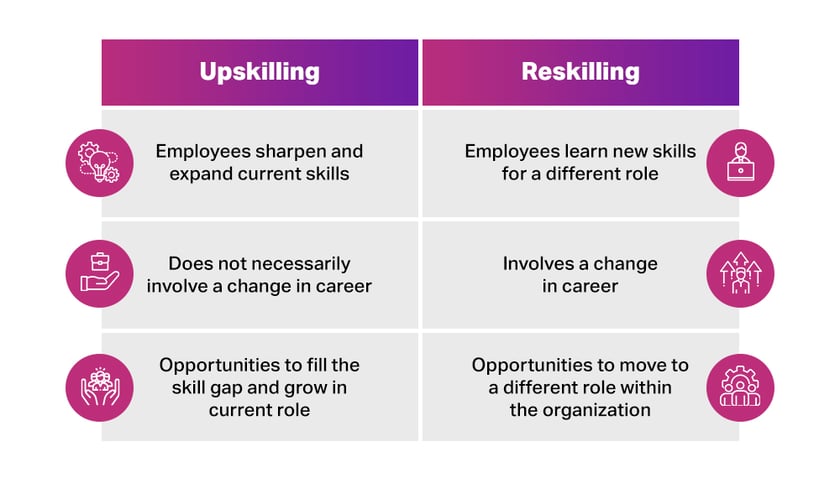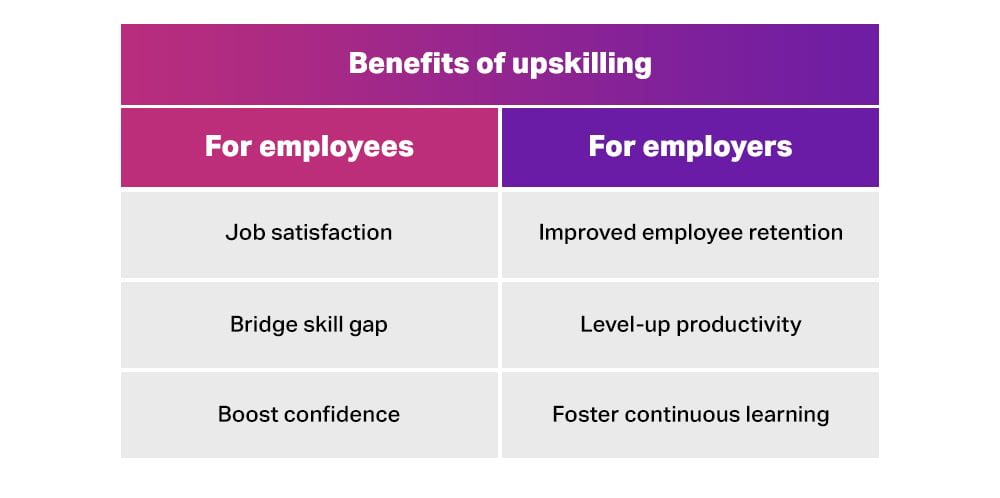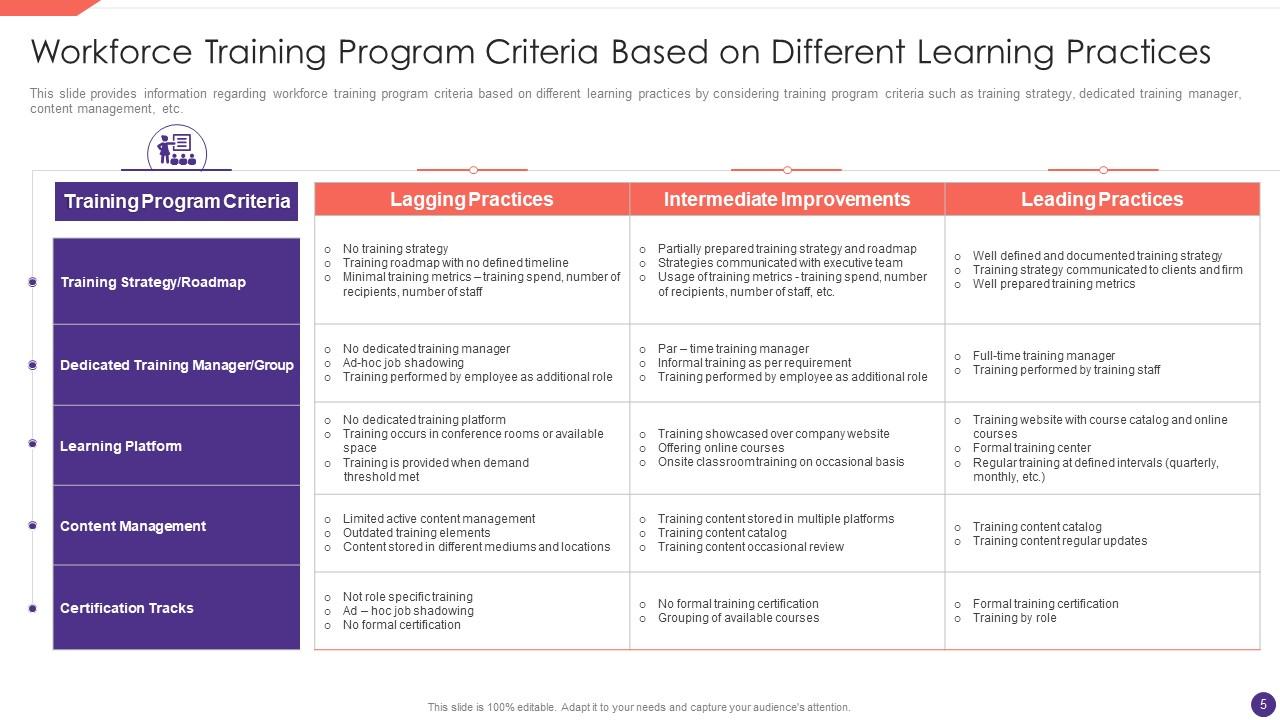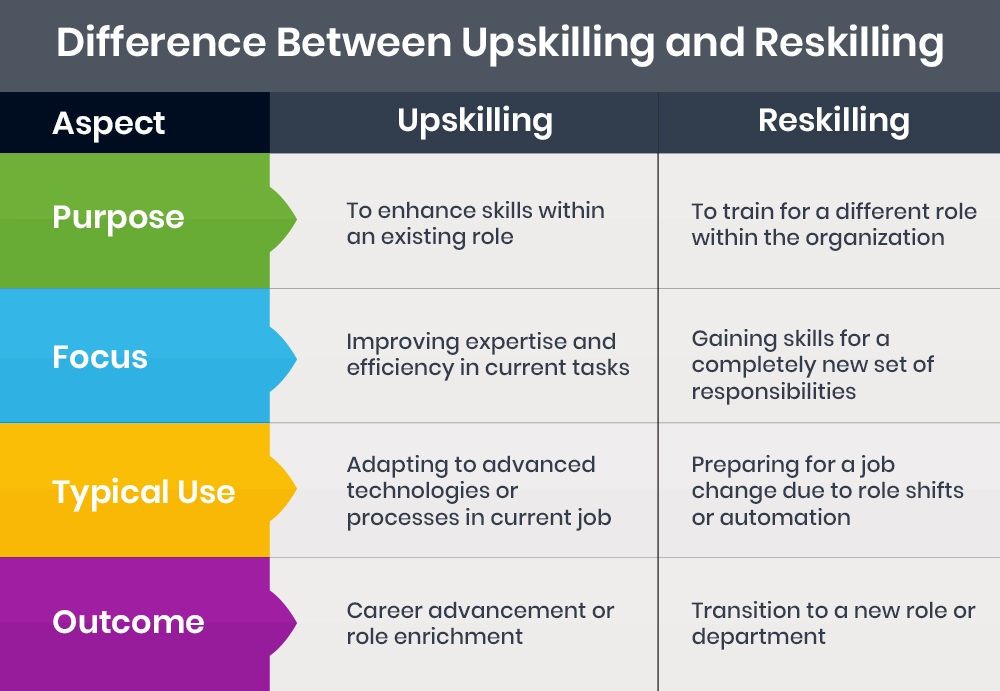
Upskilling: The Key to Advancing Your Career

If you’re like many people, you may have assumed that your formal education would equip you with everything you needed to succeed in your career. After all, you go to school, land a job, and then steadily climb the career ladder, right? But in reality, that’s not always how things unfold. The truth is, career growth often comes from a continuous process of learning and improving—not just from what you learn in school.
Why Upskilling is Essential in Today’s Job Market

While you’ve likely picked up a wealth of knowledge during your time in college, each job you’ve had offers even more valuable insights and skills. In fact, more and more people are embracing the concept of upskilling to stay ahead in the ever-evolving job market.
Upskilling simply refers to learning new skills that build on your existing knowledge. Whether you’re gaining expertise in a specific area, improving your abilities within your current job, or preparing for a promotion, upskilling helps you stay relevant and competitive in your field.
A recent Gallup study revealed that 57% of workers are eager to upgrade their skills, and 52% participated in an upskilling program in the past year. This growing interest in upskilling is largely due to the changing nature of the job market, especially following the COVID-19 pandemic, which made many workers reassess their careers and seek better work-life balance and opportunities. For many, upskilling is the best way to get a role that’s better aligned with their personal and financial goals.
The Benefits of Upskilling

So, why should you invest time and energy into upskilling? Here are some key benefits:
- Stay Current in Your Field: Constant changes in technology and business practices mean that the skills required for your job can quickly become outdated. Upskilling helps you stay informed and competitive.
- Show Your Willingness to Learn: Upskilling signals to your employer that you’re motivated, eager to improve, and committed to your career growth.
- Boost Your Job Satisfaction: Learning new things at work keeps your daily routine exciting and helps you avoid job stagnation.
- Make Yourself Stand Out: Upskilling can differentiate you from colleagues and other job candidates, making you more valuable to your employer and more marketable in the job market.
- Increase Your Earning Potential: Studies show that upskilling can increase your wages by an average of 8.6%, improving both your standard of living and your career satisfaction.
Additionally, upskilling is increasingly important for employers too. In fact, 23% of Gen Z workers would leave a job if it didn’t offer learning opportunities. Offering upskilling benefits is a great way for employers to attract and retain top talent.
How to Upskill Effectively: A Step-by-Step Guide

Successfully upskilling requires a strategic approach. Here’s how to do it:
1. Identify the Skills You Need

Start by assessing the skills you currently have and identifying the gaps that are holding you back. Look at job postings in your field and the skills they require. Pay attention to emerging trends in your industry and think about the skills that will be in demand in the future. This will help you figure out what skills to focus on.
Also, don’t forget about transferable skills, like writing or proficiency with certain software, that you can use in multiple roles.
2. Set Clear, Achievable Goals

To stay on track, define specific, measurable upskilling goals. Whether you want a promotion, a raise, more job satisfaction, or a new job entirely, your goals should be clear and well-defined. For example, aim to complete a specific course or earn a certification within a set period.
Establishing a timeline for achieving your goals will help you stay motivated and focused on your progress.
3. Find the Right Tools and Courses

Look for learning opportunities both inside and outside your organization. Many companies offer tuition reimbursement, professional development courses, or opportunities to attend industry conferences. Take advantage of these resources.
There are also plenty of online learning platforms that offer courses in various fields, including:
- LinkedIn Learning: Thousands of professional courses.
- Google Skillshop: Courses on Google Ads and Google Analytics.
- Udemy: Courses on a wide range of subjects, from design to time management.
- HubSpot Academy: Digital marketing, blogging, and social media courses.
Don’t hesitate to reach out to your employer about available learning programs—they might even pay for them!
4. Talk to Your Employer About Upskilling Benefits

If your employer doesn’t already offer upskilling opportunities, consider initiating a conversation about it. Show them how your growth can benefit the company. For instance, if you work in marketing, you could explain how learning SEO can help drive more traffic to the company website, ultimately improving the bottom line.
If your current employer doesn’t support upskilling, you may decide to independently pursue further education or even look for a job with a company that offers such benefits.
How to Use Your New Skills

The true test of upskilling is how you apply your newfound knowledge. Whether you’re looking to take on more responsibilities in your current role or apply for a new position, here’s how to leverage your new skills:
In Your Current Job:

- Ask for New Responsibilities: Take on projects that allow you to apply your newly acquired skills. For example, if you’ve learned how to use a new software tool, offer to train your colleagues or apply it to your work.
- Negotiate for a Raise: If you’re taking on more responsibilities or bringing a new skill set to the table, don’t be afraid to ask for a raise.
In a New Job:

- Highlight Your New Skills on Your Resume: Add any new certifications, skills, or courses to your resume. Be sure to show how these new skills have helped you make an impact in your current job.
- Frame Your Upskilling Journey in Interviews: Discuss your commitment to continuous learning and how it aligns with the role you’re applying for.
FAQs
1. How can I start upskilling if I don’t have a lot of time?
Look for small, manageable learning opportunities that fit into your schedule. Online courses, webinars, and bite-sized learning sessions can be a great way to fit upskilling into a busy day.
2. How do I know which skills are worth upskilling?
Look at job postings in your field and identify recurring skills. You can also ask your managers or mentors about the skills that are most in demand or will be helpful for future roles.
3. How can upskilling benefit my career in the long run?
Upskilling helps you stay relevant in your industry, increases your earning potential, and positions you for promotions. It also keeps you adaptable, making you more likely to succeed in an ever-changing job market.
4. Can I upskill without spending a lot of money?
Yes! Many resources, like LinkedIn Learning, Google Skillshop, and Udemy, offer free or affordable courses. Additionally, some employers provide tuition assistance or professional development benefits.
5. What if my employer doesn’t support upskilling?
You can pursue upskilling on your own through online platforms or by looking for opportunities with employers who value continuous learning and growth.
By actively upskilling, you position yourself as a valuable asset to your current or future employers, ensuring that you continue to grow and thrive in your career.
Continuing Your Learning Journey
Upskilling isn’t a one-time event; it’s an ongoing process. Keep looking for opportunities to learn, stay up-to-date on industry trends, and acquire new skills. Whether you’re looking for a new role, a promotion, or more responsibility, continuing to build your skill set will help you stay ahead of the curve and remain a competitive candidate.
In today’s economy, knowledge is power. Companies aren’t just hiring you for what you know right now—they’re hiring you for what you can learn and how you can adapt. With the right mindset and commitment to upskilling, you can unlock new career opportunities, increase your value to employers, and achieve your career goals.

